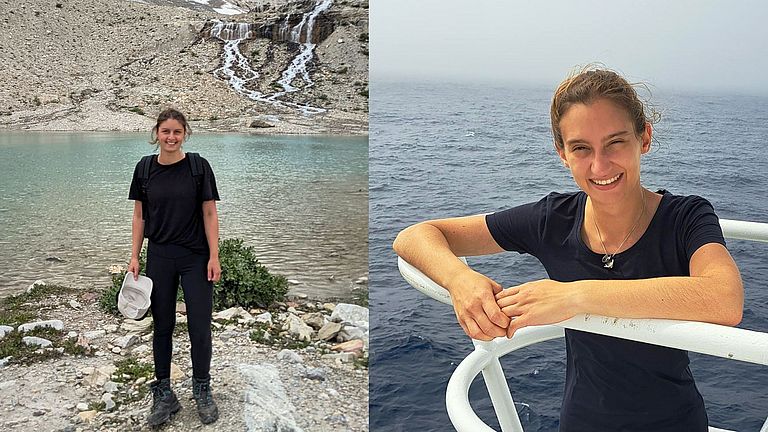Otto Krümmel Award 2022 for Deep Sea and Baltic Sea Research
Outstanding Bachelor's Thesis Award honors achievements of two young students in Earth Sciences and Physics of the Earth Systems
The Otto Krümmel Award for outstanding bachelor theses in the field of ocean science will be awarded for the sixth time, during a reception at GEOMAR Helmholtz Centre for Ocean Research Kiel. The award is named after the German oceanographer Otto Krümmel, who is commemorated in this way for his significant contribution to the field of ocean sciences. Together with other researchers, he held the view that the ocean can only be understood through international cooperation. This conviction still lives on today in many cross-national collaborations between marine scientists at GEOMAR and worldwide.
Since 2016, the Society to Support GEOMAR Helmholtz Centre for Ocean Research Kiel has awarded the prize to outstanding bachelor's degrees in ocean sciences, including the interaction of the ocean with the seafloor and the atmosphere. This is endowed with 1,500 euros, half of which is donated by the society and half by the Briese shipping company.
This year, two young female scientists were honored with the Otto Krümmel Sponsorship Award: Sophia Stavrakoudis received the prize for her degree in geosciences from Leibniz University Hanover. In the deep sea of the ocean, metal-bearing hydrothermal vents exist along plate boundaries of the Earth's crust, which can form polymetallic massive sulfide deposits on the seafloor. Depending on the geology of the particular ocean area, these deposits can contain valuable non-ferrous and precious metals, such as copper, zinc, gold and silver in high concentrations. In her work “Geochemical and Mineralogical Investigation on the newly discovered SURYA Hydrothermal Field in the Central Indian Ocean”, the award winner has for the first time examined ore and rock samples from the vicinity of the recently discovered SURYA hydrothermal field in the Indian Ocean in great detail for their ore content and composition using various modern methods. Due to the unusually high contents of copper, tin and rare metals such as gold and silver, SURYA is a scientifically interesting deposit, but a possible mining in the future will hardly be profitable because of its relatively small size. The work was supervised by Dr. Sebastian Fuchs from the Federal Institute for Geosciences and Natural Resources Hanover (Bundesanstalt für Geowissenschaften und Rohstoffe Hannover, BGR).
Vera Stockmayer is a student at Kiel University (Christian-Albrechts-Universität zu Kiel, CAU). She receives the award for her achievements in the course Physics of the Earth Systems, Oceanography. In her work “Variations of Temperature, Salinity and Oxygen of the Baltic Sea for the Period 1950 to 2020” she investigates how climatological changes of the last seven decades affect the hydrography of the Baltic Sea. For this purpose, observational data and data from a numerical circulation model of the Baltic Sea were analyzed. In addition, atmospheric parameters were considered to determine their influence on hydrographic variations. Sea surface temperature variations are closely related to changes in air temperature. Overall, the entire water column of the Baltic Sea has warmed over the period from 1950 to 2020. The trend is strongest at the sea surface, which has warmed by about 0.3-0.4°C per decade. For surface salinity, variability is pronounced on annual and decadal time scales and correlated with river water input to the Baltic Sea. Trend calculations show a significant decrease in surface salinity and an increase below the haline thermocline. The cause of the reciprocal trends in salinity is the subject of current research. Annual and interannual variations in surface oxygen concentration are negatively correlated with water temperature. Increasing water temperatures affect oxygen solubility at the sea surface and enhance oxygen consumption by biogeochemical processes. The work was supervised by Dr. Andreas Lehmann of GEOMAR.
"We are pleased about the meaningful, high-quality and diverse applications to the Otto Krümmel Award" says Professor Dr. Hermann Bange, chemical oceanographer at GEOMAR and board member in the Society to Support GEOMAR. "This shows once again that his idea of interdisciplinary collaboration for excellent marine research bears fruit. We congratulate the two scientists on the well-deserved award and wish them much success for the next steps."






